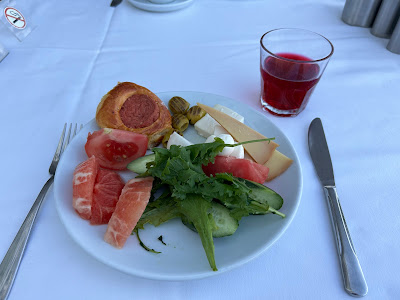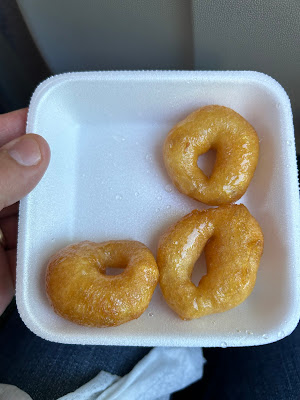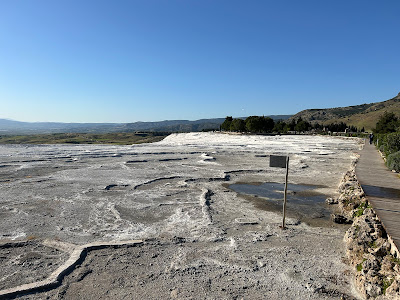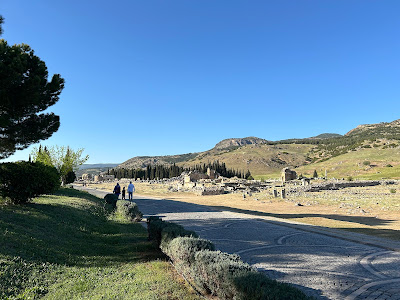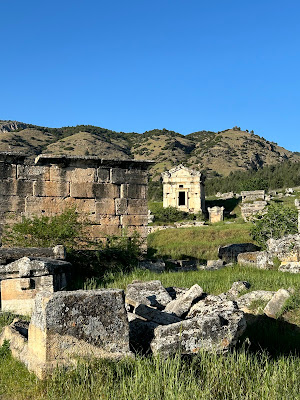26 September 20XX+1
My
Dear Lucilius:
Today
I took a walk up the road that leads to the North.
I
have not been up this road in at least three months, not since I rode
in a truck over the hill towards McAdams. For walking up the road it
has been even longer.
It
is a funny thing, heading out now. Beyond just the things that I
would have always brought – my wallet, perhaps a pocket knife – I
now sport other things: a much larger knife on my belt on one side
and a holster on the other, a backpack that has the makings of fire
and bandages and a small snack, and a foldable saw, a water bottle
stuffed into the side. I recently I have taken to carrying a small
coil of rope around to make a bundle of any and all wood that I can
find.
The
road itself looks as it always had; one could scarcely tell that the
civilization went on pause a year ago, except for the fact that the
weeds which would normally have been cut down have reached full grown
now. Brown and dry, they chatter in the Autumn wind.
We were
fortunate not to have any fire this year. The fact that we could
haunts me, one of the things I cannot truly prevent except to work to
cut down the weeds in a defensible space all around The Cabin. It
seems like senseless work at times, this cutting of vegetation that
is neither for food nor fuel. Still, senseless work is not always
the same thing as useless work.
I
pass one of the outlying houses as I am on my way. A small herd of
cattle is in one of the fields nearby so the house has to be
inhabited, but I am far enough away that I cannot make out any sign
that it is. I presume, given the presence of cattle, that someone is
watching me even if I cannot see them; I raise my hand in greeting to
my unknown watcher. If they see me, there is no sign back.
The
seasonal campgrounds where I did my laundry for years on on my left.
Beyond our flow of refugees last year, there has been no-one that
used the space: without electricity there is no heating things like
trailers or RVs or tents, and without heat no-one stays here in
Winter. The paint is a little faded – it was in a decline even in
the last few years as our town became a place to drive through, not
to stay – but surprisingly to me, the windows appear to all be
intact. To my mind I cannot recall whether there is anything left
inside the office/store, or even if the last owners that were there
had simply left last year and not come back. I make a note in my
mind to ask Young Xerxes about it upon my return; the supplies would
be welcome and to be frank, I eye the wood of picnic tables and
benches that are weathered but likely would burn right fairly.
Past
the campground I pick up at the
local creek with the eponymous trees lining its banks. The
creeks, rivers, streams, and rills always seem to run here – a
handy thing in that for all that we have endured in the last year and
a bit, the loss of water has not been one of those issues (to be
fair, it was one reason I chose this location). Trees have more or
less lined the way here periodically, but these trees are far enough
away that later in Winter they will not be as readily accessible;
better to get the wood now.
Carefully
picking my way through a sagging fence of rusty-red wire, I
start my search. Within in a few minutes, I find two or three
branches I can cut and carry back with me; pulling out my saw, I get
to work.
Ideally
I would have an ax to do this, as sharpening saw teeth is a bit
beyond my skill level – but given that I have no
transportation other than my legs, anything that cannot be bundled
and carried on a back or shoulder simply becomes unachievable. I can
shoulder a small bundle of branches; I can only carry a very few logs.
The
branches make a raspy cutting sound as I saw them, a combination of
wood and sawdust and metal that I remember from when I had to trim
tree branches back in the days when I had a very different life and
was perched up on a ladder. It is odd to me that it seems like a
different life entirely.
As I
cut and remember, it brings to mind my children. I wonder where they
are in all of this. Are they safe? Are they somewhere they are
protected? It is all beyond my ability to change at this point;
those choices were made long before this day. Still, I worry.
I
speak to Pompeia Paulina about them sometimes. She always listens
attentively and says the kindest and most positive things. Part of
me wishes that they could meet her and vice versa. Part of me
wonders about the wisdom of that: the last conversations we had were
what could only be called contentious, although I wonder that given
the world that we all now seem to live in, if those things would even
be worthy to consider being talked about.
The
stillness between finishing with each branch is almost breathtaking.
One of the greatest differences I find in our changed world is how
much silence there truly is. Man-made noise – the roar of autos or
the drone of mowers and weed eaters and the sounds of music – are
discordant in this world; it immediately draws attention to itself in
a way that is both intrusive and dangerous. One begins to understand
while natural world is so often filled with silence: noise is deadly
and potentially life ending.
Finishing
my cuts, I carefully wipe down the saw with a rag in the bag to
remove all the sawdust, then fold it gently and replace it in my
backpack. Like so many things now it is effectively irreplaceable –
or even if it could be replaced, what would I offer for it? Laying
the cut branches into a stack, I tie my cord around them, making a
bundle I can sling over my shoulder. Repacking my pack, I hoist it
and the branches up and make my way back to the road.
The
dead grasses crunch as I make my way back to the road, where they
transition to a short crunch of gravel before they hit the less
yielding ground of pavement. Overhead I hear the chanting of flocks
of birds, heading to their Winter quarters. I wonder if they realize
that for the first time in almost 200 years, likely they can fly most
or all of the way there without seeing a single human or hearing the
below of a single rifle or shotgun.
The
trip back is as silent as the trip out. As I pass the cattle, I see
a figure now standing by the tree. They wave at me; I wave back.
People waved here before any of this started on the roads as one
would drive by; the fact that they still do it is a bit heartening.
Hitting
the gravel road that leads home, my feet start crunching again. The
creek in front of the house burbles as it runs by, an occasional
“plop” suggesting a fish that is after the encroaching insect
population. I have tried to manage my fishing here, reserving it for
when things are truly desperate and I need a food source outdoor.
A
thin trail of smoke leaks from the chimney, dissipating into the
breeze as I turn into the lot The Cabin sits on. This remains the
one thing I worry about in terms of the appearance of habitation and
for which I do not have a good solution yet; perhaps I can bank the
fire lower and still generate some heat.
I am
hopeful that something exciting is on the menu, but in my heart I
know it likely be the same selection of things that we have had for
the last few months. I am grateful for it of course, even as I am
grateful for the company that will serve it and eat it with me.
It
is the small things that we must look to, Lucilius, for joy in these
times.
Your
Obedient Servant, Seneca






